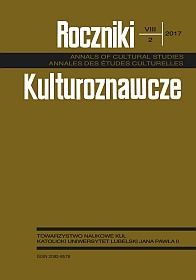Roman Palester and Andrzej Panufnik: Their Roads to Emigration
Abstract
After the end of the Second World War, a large group of Polish composers decided to stay outside Poland. In the next few years this group was enlarged by other composers who had initially tried to make their lives in People’s Poland, searching for their own place within the framework of the imposed communist system. In 1949, Roman Palester (1909–1989), one of the most important Polish composers of the pre-war period and very active in the first years after the war, took the decision to remain in France. Soon afterwards he started working for Radio Free Europe in Munich, where he was responsible for preparing cultural programmes as the head of the cultural department. Simultaneously, he kept composing and managed to write many works of distinction. Unfortunately, his music today remains almost entirely forgotten.
Andrzej Panufnik (1914–1991) took a quite a different road, deciding to leave Poland illegally in 1954. He settled in the United Kingdom, where after some extremely hard years he started to gain sustained recognition both as a composer and a conductor. His works are nowadays in the repertoire of many outstanding soloists and orchestras all over the world. However — as is also in the case with Roman Palester — the long-lasting censorship of his music and of any mention of his name in the Polish press meant that it was hard to consider him as part of 20th-century Polish musical culture. It is still difficult to bridge this gap.
Why Roman Palester and Andrzej Panufnik decided to choose emigration and how this decision determined their lives henceforth? How did it influence the reception of both composers and the presence (or non-presence) of their music in Polish cultural life of the last seven decades? This article aims to answer these questions.
References
Andrzej Panufnik’s Music and Its Reception. Red. Jadwiga Paja-Stach. Kraków: Musica Iagellonica, 2003
Bolesławska, Beata. Panufnik. Kraków: Polskie Wydawnictwo Muzyczne, 2001
Bolesławska, Beata. „Andrzej Panufnik and the Pressures of Stalinism in Post-War Poland”. Tempo (Londyn) (2002), 220 (kwiecień): 14–19.
Bolesławska-Lewandowska, Beata. Aneks do Raportu o obecności muzyki Andrzeja Panufnika w Polsce i na świecie. Warszawa: Instytut Muzyki i Tańca, 2015. Publikacja online: http://imit.org.pl/uploads/materials/files/Aneks_do_raportu_o_obecnosci_muzyki_andrzeja_panufnika_w_polsce_i_na_swiecie.pdf.
Chłopecki, Andrzej. „Epitafium katyńskie”. Gazeta Wyborcza 26 kwietnia 2010. Felieton dostępny online: http://wyborcza.pl/1,76842,7807798,Epitafium_katynskie.html
Ekier, Jakub. „Druga pokuta Sir Andrzeja. Spory wokół Andrzeja Panufnika”. Ruch Muzyczny (2015), 7: 24–29
Helman, Zofia. Roman Palester. Twórca i dzieło. Kraków: Musica Iagellonica, 1999.
Kaczyński, Tadeusz. „Trzydzieści pięć lat muzyki. Rozmowa z Romanem Palestrem”. Ruch Muzyczny 8 (1964), 20: 5–7.
Kaczyński, Tadeusz. Andrzej Panufnik i jego muzyka. Warszawa: PWN, 1994.
Kopeczek-Michalska, Krystyna. „Jawne i tajne życie koncertowe w Warszawie w latach okupacji hitlerowskiej”. Muzyka (1970), 3: 47–64
Markowska, Elżbieta: Jana Krenza pięćdziesiąt lat z batutą. Rozmowy o muzyce polskiej. Kraków: Polskie Wydawnictwo Muzyczne, 1996.
Muzyka źle obecna. T. 1–2. Red. Krystyna Tarnawska-Kaczorowska. Warszawa: Związek Kompozytorów Polskich, 1988.
Okupacyjne losy muzyków. Warszawa 1939–1945. Koncepcja, wybór i opracowanie Elżbieta Markowska i Katarzyna Naliwajek-Mazurek. Warszawa: Towarzystwo im. Witolda Lutosławskiego 2014; Tom 2 — koncepcja, wybór i opracowanie Katarzyna Naliwajek-Mazurek i Andrzej Spóz. Warszawa: Towarzystwo im. Witolda Lutosławskiego, 2015
Panufnik, Andrzej. Autobiografia. Przeł. Marta Glińska i Beata Bolesławska-Lewandowska. Warszawa: Wydawnictwo Marginesy, 2014.
Panufnik, Andrzej. „Życie muzyczne w dzisiejszej Polsce”. Kultura (Paryż) (1955), 1 (87) –2 (88): 7–19.
Thomas, Adrian. „File 750: Composers, Politics and Festival of Polish Music (1951)”. Polish Music Journal 5 (2002), 1 (Summer). http://pmc.usc.edu//PMJ/issue/5.1.02/thomasfile.html
Thomas, Adrian. „In the public eye: Panufnik and his Music: 1948–54”. W Andrzej Panufnik’s Music and Its Reception. Red. Jadwiga Paja-Stach, 205–220. Kraków: Musica Iagellonica, 2003
Tompkins, David G. Composing the Party Line. Music and Politics in Cold War Poland and East Germany. West Lafayette: Purdue University Press, 2013.
Wieczorek, Sławomir. Na froncie muzyki. Socrealistyczny dyskurs o muzyce w Polsce w latach 1948- 1955. Wrocław: Wydawnictwo Uniwersytetu Wrocławskiego, 2014.
Zygmunt Mycielski — Andrzej Panufnik: korespondencja. Część 1: Lata 1949–1969. Opracowanie, wstęp i komentarze Beata Bolesławska-Lewandowska. Warszawa: Instytut Sztuki PAN, 2016.





